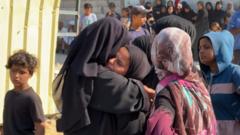The suggestion of air dropping aid to Gaza has been met with skepticism. As countries call for an end to restrictions on humanitarian assistance, critics argue that while aerial aid may serve to ease immediate suffering, it is not a sustainable solution to the ongoing hunger crisis. Only long-term strategies and ceasefires can provide a resolution.
Air Drops of Aid in Gaza: A Temporary Solution to an Ongoing Crisis

Air Drops of Aid in Gaza: A Temporary Solution to an Ongoing Crisis
Amidst widespread hunger in Gaza, air drops of humanitarian aid are being proposed as a response to escalating starvation rates. However, experts warn that this method, often viewed as desperate and inefficient, is inadequate to address the deep-rooted issues of hunger.
As starvation grips Gaza, the idea of air-dropping humanitarian aid is being floated, drawing both attention and criticism for its efficacy. Despite the urgency expressed by nations like the UK, France, and Germany to mitigate hunger, Israel's claims of no restrictions on ground aid are met with skepticism from allies and international organizations.
Jeremy Bowen, the international editor reporting from Jerusalem, recalls his own experiences witnessing air drops in past conflicts, noting the crude nature of the process that often leads to further chaos and danger. Historical instances in Iraqi Kurdistan and Bosnia illustrate the risks involved, including bombings and injuries sustained by those desperately attempting to access aid that fell in dangerous locations.
Air drops can create a misleading perception of effective intervention, showcasing aid efforts on television screens while failing to meet the true needs of affected populations. Aid specialists emphasize that aerial delivery should be a last resort, particularly when routes for logistical support are readily available, like the nearby ports of Ashdod and Jordan.
For the besieged population in Gaza, densely packed into makeshift accommodations, the reality is grim: each dropped pallet can lead to violent struggles for scarce resources, exacerbating the suffering of families trying to survive. With reports indicating that nearly a third of Gaza's residents are going days without food, the pressing question remains: Will temporary air aid suffice, or is a comprehensive, long-term humanitarian strategy necessary to truly combat hunger?



















